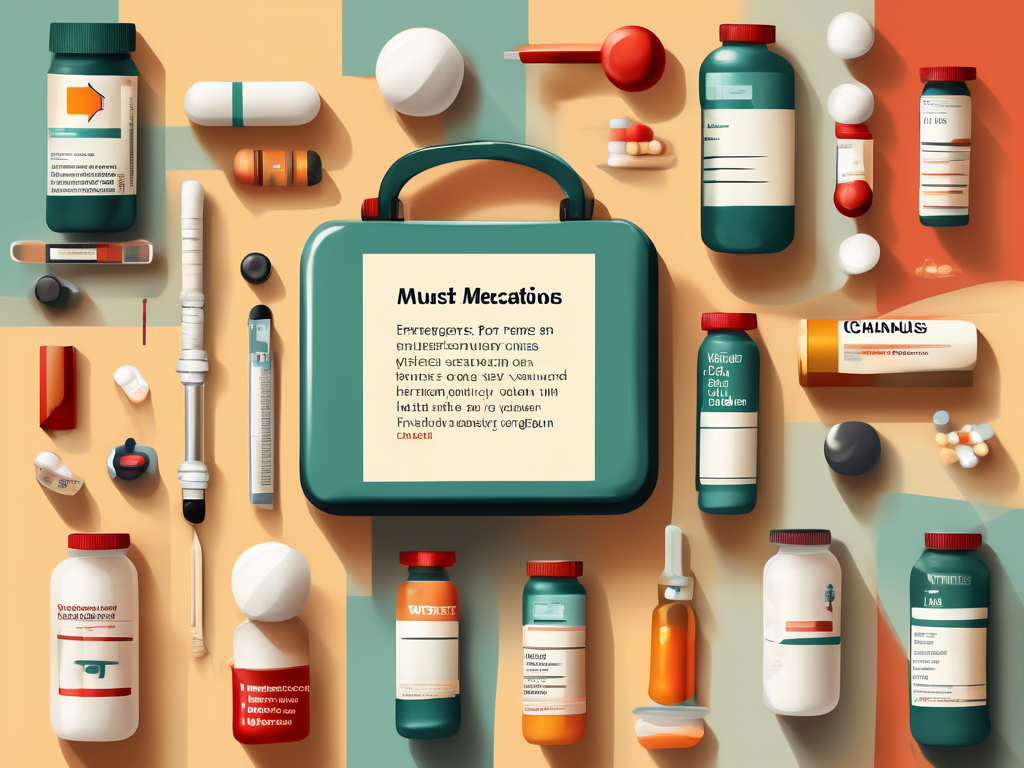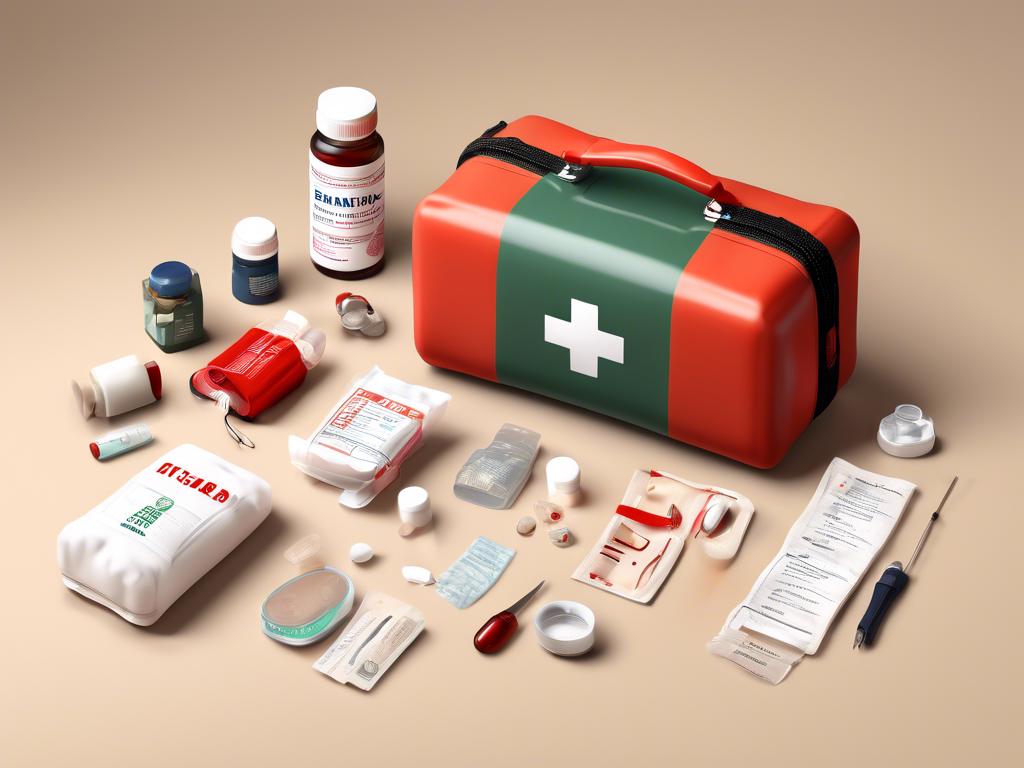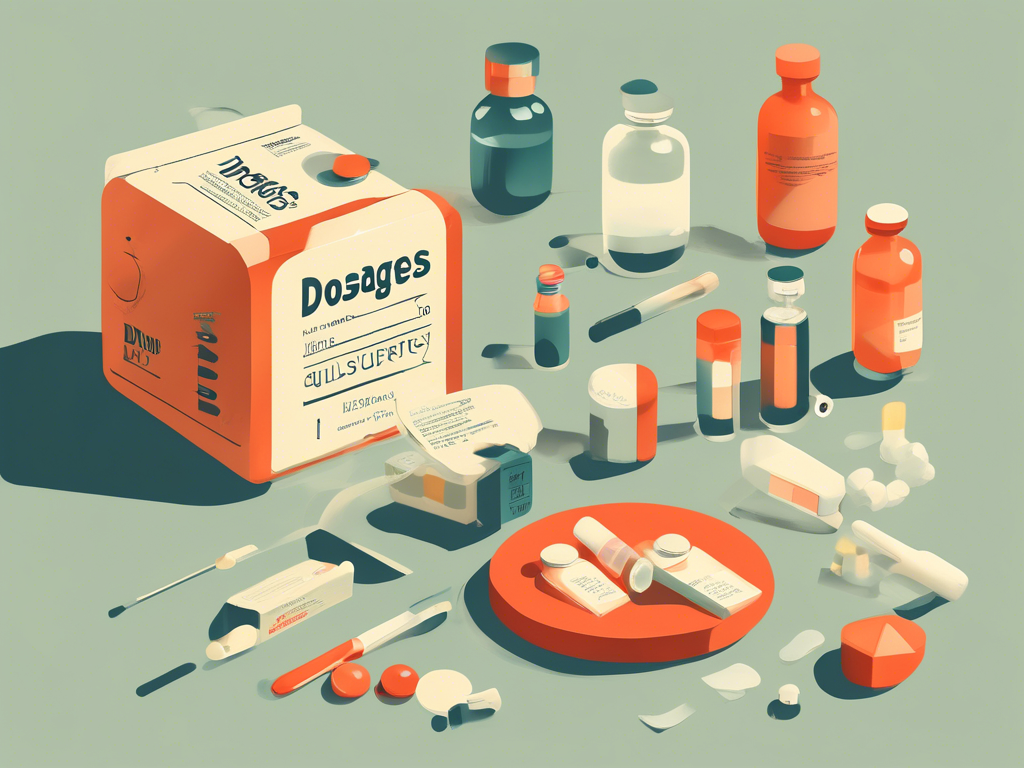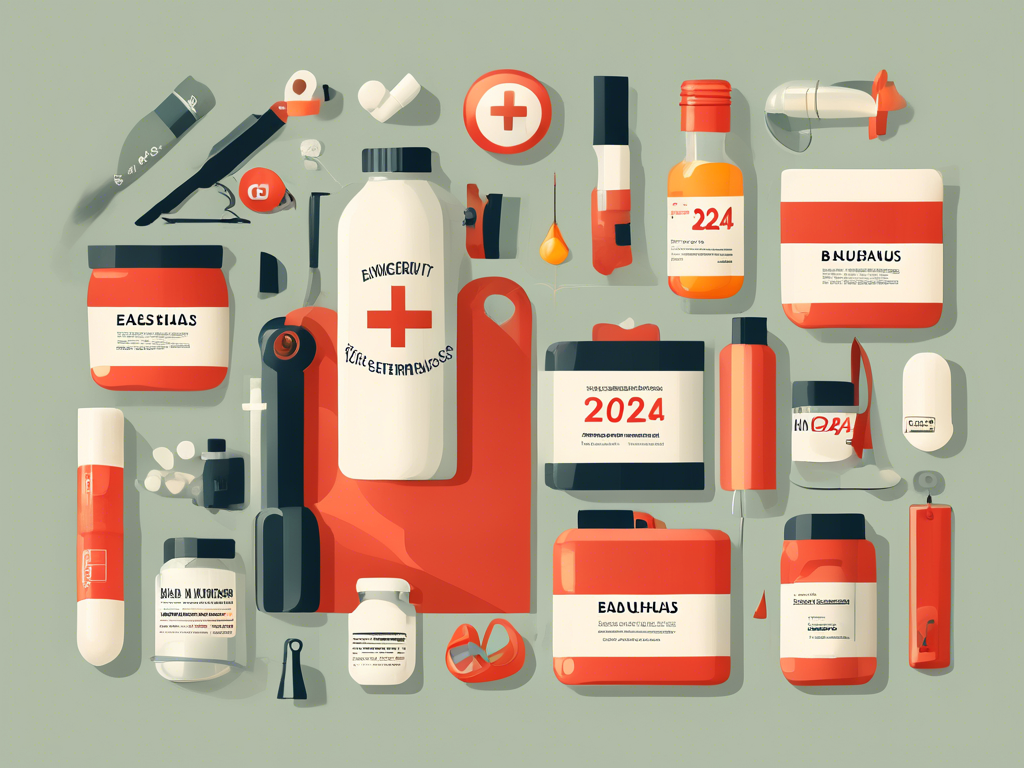In today’s unpredictable world, being prepared for emergencies has never been more critical. Whether facing natural disasters, unexpected health issues, or even minor accidents, having an optimal emergency kit can make all the difference in ensuring your safety and well-being. But beyond the usual supplies like food and water, what specific medications should you include to be truly prepared?
This guide aims to equip you with essential knowledge about the medications that every emergency kit should contain in 2024. From prescription medications to life-saving over-the-counter drugs, we will explore a comprehensive list of items that cater to various health needs, including chronic conditions. Understanding the importance of each medication is crucial for effective emergency preparedness.
We will also discuss how to properly choose antibiotics, pain relief medications, antihistamines, and more, ensuring you know not only what to include but also why it’s necessary. So if you’re ready to bolster your emergency kit with the right drugs, let’s dive into our detailed discussion on the essential medications for your emergency preparedness.
Top Prescription Medications Every Emergency Kit Should Include

Essential Pain Relievers
When assembling your emergency kit drugs, it’s essential to include effective pain relievers. Medications such as Ibuprofen and Acetaminophen can help manage moderate pain resulting from injuries or headaches. These over-the-counter options are invaluable in providing quick relief when professional help may not be immediately available. Don’t forget to check expiration dates regularly to ensure their efficacy! 💊
Antihistamines for Allergic Reactions
In cases of unexpected allergic reactions, having an antihistamine in your emergency kit is crucial. Medications like Loratadine or Diphenhydramine can help alleviate symptoms such as sneezing, itching, and rashes. Keep in mind that some antihistamines may cause drowsiness, so it’s best to consult with a healthcare provider to choose the right one for your needs. 🌿
Prescription Antibiotics
Having a prescription antibiotic like Amoxicillin in your emergency supplies can be a lifesaver if you encounter a bacterial infection during a crisis. These medications should always be prescribed by a healthcare professional, and they require proper diagnosis and usage guidelines. Consider keeping a small supply in your emergency drug kit after discussing it with your doctor about possible scenarios where you may need them. 🚑
Emergency Asthma Inhalers
For those who have asthma, ensuring that your emergency kit includes a rescue inhaler, such as Albuterol, is vital. Asthma attacks can occur suddenly, and having quick access to medication can prevent serious complications. Make sure to store it in a temperature-controlled area and check expiration dates regularly to guarantee its effectiveness. 🌬️
Heart Medications
Anyone with a known heart condition should maintain their emergency drug kit with essential heart medications, such as nitroglycerin. This can help alleviate chest pain or discomfort while waiting for medical assistance. Always consult your physician on how much to include and confirm you’re prepared for any potential cardiac emergencies. ❤️
Antidiarrheal Medications
Traveling or facing uncertain sanitary conditions can lead to digestive issues. Including **Loperamide** or similar antidiarrheal medications in your emergency kit drugs helps manage unexpected gastrointestinal disturbances. Be sure to follow dosage instructions carefully, as dehydration can quickly become a concern during severe diarrhea episodes. 🌍
Essential Over-the-Counter Drugs for Your Emergency Preparedness

Important Cold and Flu Medications
When preparing your emergency kit drugs, it’s wise to include medications that can help alleviate cold and flu symptoms. Products containing Phenylephrine or Pseudoephedrine can effectively relieve nasal congestion, while Dextromethorphan is great for suppressing coughs. Consider including a combination medicine for comprehensive relief. Remember, treating symptoms quickly can make a significant difference during stressful times! 🤧💊
Stomach Settlers: Antacids and Anti-nausea Drugs
Gastrointestinal issues can arise unexpectedly, especially during emergencies. Including antacids such as Calcium carbonate or Magnesium hydroxide in your emergency drug kit can provide quick relief from heartburn and indigestion. Additionally, consider adding anti-nausea medications like Meclizine or Dimenhydrinate to help control nausea or motion sickness symptoms. Keeping these on hand can enhance comfort when you need it most. 🥴
First Aid Essentials: Antibiotic Ointments
For minor cuts and scrapes, an *antibiotic ointment* like Neosporin is a must-have in your emergency kit. This over-the-counter medication helps prevent infection and promotes healing. Apply it promptly after cleaning the wound, and cover with a clean bandage. It’s also advisable to have a supply of sterile gauze and adhesive bandages to assist in basic first-aid procedures. 🩹✨
Electrolyte Replacements
Staying hydrated is crucial in any emergency situation. Including electrolyte solutions like Pedialyte or powdered electrolyte packets in your emergency drug kit can help replenish lost fluids and essential minerals. These are particularly beneficial in cases of dehydration due to diarrhea, vomiting, or excessive heat. Keep some handy to ensure you and your family stay hydrated and healthy, no matter the circumstances! 💧⚡
Relaxation Aids
Stressful situations can lead to anxiety; thus, including over-the-counter relaxation aids can be very beneficial. Look for products that contain Melatonin or Valerian root which may help induce calm and promote better sleep. Having these in your emergency kit drugs can provide comfort when facing uncertainty and stress. Rest and relaxation are important for maintaining mental well-being during emergencies! 😌🌙
How to Choose the Right Antibiotics for Your Emergency Kit

Understanding the Types of Antibiotics
When selecting antibiotics for your emergency kit drugs, it’s important to know the different types available. Broad-spectrum antibiotics, like Amoxicillin, target a variety of bacteria and are often recommended for general use in emergencies. Other antibiotics like Ciprofloxacin specifically target more resistant strains and may be suitable for certain infections. Always consult with a healthcare professional to determine which antibiotics are appropriate for your specific needs. 🦠
Consulting with Healthcare Professionals
Before adding any antibiotics to your emergency drug kit, it’s essential to discuss your options with a healthcare provider. They can provide personalized recommendations based on your medical history, potential antibiotic allergies, and the types of infections that may be more common in your area. This proactive approach ensures compliance with regulations and effectiveness in treating potential infections. 🩺
Storage and Shelf Life Considerations
Proper storage is key to ensuring the effectiveness of antibiotics in your emergency kit. Most antibiotics should be stored in a cool, dry place away from direct sunlight. Additionally, check the expiration dates regularly. If an antibiotic expires, it may lose potency and could lead to ineffective treatment when you need it most. Consider keeping a checklist to track medications and their expiration status. 📅
Dosage and Administration Guidelines
Understanding the correct dosage of antibiotics is crucial for effective treatment. Always include detailed instructions on how to administer each antibiotic in your emergency drug kit. For instance, some antibiotics require you to take them with food, while others should be taken on an empty stomach. Create an easy-to-follow guide for anyone who might need to use the medications in an emergency. 📜
Alternatives and Additional Treatments
In addition to antibiotics, consider including alternative treatments in your emergency kit drugs, such as antiseptics or natural remedies that can support healing. Herbal treatments like Echinacea or Garlic can help boost the immune system and may provide relief for minor infections. Ensure these alternatives are effective and consult with healthcare professionals about their appropriateness for your emergency scenarios. 🌿
Legal and Ethical Considerations
It’s crucial to understand the legal implications of possessing antibiotics without a prescription. Many regions have strict regulations surrounding the distribution and use of antibiotics due to the risk of misuse and antibiotic resistance. Ensure you are informed about local laws to avoid any legal issues while maintaining your emergency drug kit responsibly. ⚖️
Guide to Pain Relief Medications for Unexpected Situations

Common Pain Relievers in Your Emergency Kit
When preparing your emergency kit drugs, it is vital to include common pain relievers that can ease discomfort in various situations. Medications like Ibuprofen, which helps reduce inflammation, and Acetaminophen, effective for pain management, should be staples in your kit. These medications can help alleviate pain from injuries, headaches, or muscle aches when immediate medical assistance is not available. Always store them in their original packaging to keep track of expiration dates! 💊
Topical Pain Relief Options
For localized pain relief, consider adding topical pain relief options to your emergency drug kit. Creams or patches containing agents like Menthol or Lidocaine can provide rapid relief for muscle soreness or joint pain. These products are easy to apply and can be particularly useful during outdoor activities or emergencies where movement may be limited. Remember to check the instructions as some formulations have specific guidelines for application frequency. 🧴✨
Pain Management for Chronic Conditions
If you or a family member has chronic pain conditions such as arthritis or fibromyalgia, it’s essential to have medications tailored for these situations in your emergency kit. Consult with your healthcare provider to determine which medications, including prescription options, are appropriate and how to store them properly. Having a plan in place ensures you are prepared to manage symptoms effectively during unforeseen events. 🩺💡
Natural Pain Relief Alternatives
In addition to traditional pain medications, including natural alternatives can also be beneficial in your emergency kit drugs. Products containing Turmeric or Ginger are known for their anti-inflammatory properties and may assist in managing pain naturally. Always consider potential allergies and consult a healthcare professional before incorporating these into your regimen to ensure safety and effectiveness. 🌿🌼
Signs That Require Immediate Medical Attention
While pain can often be managed with appropriate medications, there are signs that necessitate immediate medical attention. If someone experiences severe pain accompanied by symptoms such as high fever, loss of consciousness, or difficulty breathing, do not hesitate to call for emergency services. Familiarize yourself and your family with these warning signs to ensure prompt action during critical situations. 🚨⚠️
The Importance of Antihistamines in Your Emergency Drug List

Understanding Allergic Reactions
Allergic reactions can range from mild to severe, and knowing how to manage them is essential for your emergency kit drugs. Common allergens include pollen, certain foods, insect stings, and medications. Symptoms can vary but often include itching, hives, and difficulty breathing. Including antihistamines such as Loratadine or Diphenhydramine in your kit can help relieve these symptoms quickly, providing peace of mind during emergencies. 🌸
Dosing and Usage of Antihistamines
It’s crucial to understand the correct dosage and usage of antihistamines in your emergency drug kit. Here are some important points to remember:
- Check age and weight guidelines on the medication package.
- Some antihistamines may cause drowsiness—ensure you know which ones to avoid if you need to stay alert.
- Always consult a healthcare provider when selecting antihistamines, particularly for children or individuals with pre-existing conditions.
By ensuring proper dosing, you maximize the effectiveness of these medications when they’re needed most. 📏💊
Antihistamines for Severe Reactions
In cases of severe allergic reactions, known as anaphylaxis, having an antihistamine on hand is critically important. While antihistamines can help with mild symptoms, they are not substitutes for emergency treatment. In anaphylaxis, always use an epinephrine auto-injector if available and call emergency services. Adding antihistamines to your emergency kit provides a complementary approach to managing allergies while waiting for professional help. 🚑⚠️
Storing Antihistamines Properly
To ensure that antihistamines remain effective, proper storage is vital. Keep these medications in a cool, dry place away from direct sunlight. It’s also advisable to check expiration dates regularly and replace expired products to maintain a ready supply in your emergency drug kit. Consider using a checklist to track your supplies and their statuses effectively. 🗂️🕰️
The Role of Antihistamines Beyond Allergies
Interestingly, antihistamines have other uses beyond treating allergies. Some can alleviate symptoms of common colds or flu by reducing nasal congestion and sneezing. Additionally, certain antihistamines may also aid those suffering from motion sickness. Including a versatile antihistamine in your emergency kit drugs not only supports allergy management but can also provide broader benefits during various health situations. 🌍💧
Must-Have Medications for Chronic Conditions in Your Emergency Kit

Essential Medications for Diabetes
If you or a family member has diabetes, having a supply of necessary medications is crucial in your emergency kit drugs. Insulin should be stored properly, either in a cooler or insulated pack, while oral medications like Metformin should also be included. Don’t forget to pack blood glucose monitoring supplies, such as testing strips and a glucometer, to ensure stable blood sugar levels during an emergency. Regularly check expiration dates to keep your supplies effective! 🩸
Heart Condition Medications
For individuals with heart conditions, including essential medications like beta-blockers or ACE inhibitors in your emergency drug kit can be lifesaving. These medications help manage blood pressure and heart function, providing stability during crises. Be sure to have a list of dosages and any specific instructions from a healthcare provider on hand, and consider storing medications in their original bottles for easy identification. ❤️🩺
Mental Health Medications
If you or a family member relies on mental health medications such as antidepressants or anti-anxiety medications, including them in your emergency kit is vital for maintaining emotional well-being. Consult your healthcare provider to determine the right dosages and specific needs. Having these medications available can help manage stress and anxiety during challenging situations, ensuring mental health is prioritized alongside physical health. 🌈🧠
Medications for Seizure Disorders
For those with seizure disorders, including medications such as Levetiracetam or Lamotrigine in your emergency drug kit is essential. These medications should be kept in a secure container to prevent accidental spillage. It’s also helpful to include a plan detailing how to administer medication during a seizure and steps to take in case of an emergency. This proactive approach ensures safety and preparedness when facing unforeseen circumstances. ⚡📋
Allergy Medications for Sensitive Individuals
If you or a loved one has severe allergies or sensitivities, it’s crucial to have medications like epinephrine auto-injectors included in your emergency kit drugs. These devices can reverse anaphylactic reactions rapidly and are lifesaving in critical moments. Don’t forget to carry prescribed antihistamines like Diphenhydramine as well, to manage milder allergic symptoms effectively during emergencies. Regularly check the expiration dates and ensure they are easily accessible! 🌼🚨
Emergency Kit Essentials: First Aid vs. Medication Needs

The Basics of First Aid Supplies
An effective emergency kit begins with a solid foundation of first aid supplies. Items such as adhesive bandages, sterile gauze pads, and antiseptic wipes are essential for treating minor injuries like cuts and scrapes. Additionally, including medical tape, scissors, and tweezers can enhance your ability to address various situations effectively. Regularly checking and restocking these items will ensure that you’re always prepared for unexpected emergencies! 🩹✨
Identifying Medication Needs
Compared to first aid supplies, the selection of medications in your emergency kit drugs requires special attention. It’s essential to evaluate individual health needs, especially if family members take regular medications. Begin by consulting with healthcare providers to identify which prescription and over-the-counter medications should be included based on personal health conditions, allergies, or chronic illnesses. Tailoring your kit to meet these specific needs ensures that everyone can receive vital care when necessary. 💊📋
First Aid vs. Medication: When to Use Which
Knowing the distinction between first aid and medication is crucial for effective emergency response. First aid supplies are primarily for treating injuries like cuts, burns, or sprains, while medications in your emergency drug kit address health issues such as pain relief, allergic reactions, or specific medical conditions. For instance, if someone has a minor cut, apply antiseptic and a bandage. Conversely, if they experience a severe headache, utilize appropriate pain relievers from your medication supply. Understanding these differences can significantly impact how effectively you respond in emergencies. ⚕️🚑
Regular Maintenance and Updates
Both first aid supplies and medications require regular maintenance to remain effective. Create a schedule for reviewing expiration dates and replacing any expired items in your emergency kit. This proactive approach not only ensures you have the right supplies on hand but also promotes peace of mind during unpredictable situations. Consider keeping a checklist that includes both your first aid items and medications so you can efficiently track and update your supplies as needed. 📅🔍
Educating Your Family on Emergency Preparedness
Finally, educating your family about the contents and use of your emergency kit drugs and first aid supplies is vital to enhancing overall preparedness. Conduct drills on how to respond in case of an emergency, including identifying when to use first aid versus medications. Discussing the plan and ensuring everyone knows where to find the kit can reduce panic and promote efficient responses when crises arise. Knowledge is a powerful tool in managing emergencies effectively! 🏫👨👩👦
Understanding Dosages: What to Include in Your Emergency Drug Supplies

The Importance of Accurate Dosage
When it comes to your emergency kit drugs, understanding the importance of accurate dosage is vital for effective treatment. Incorrect dosages can lead to ineffective relief or, worse, adverse reactions. Always refer to the medication packaging for specific dosage instructions and ensure that anyone who may need to administer the medication understands how to do it correctly. Familiarizing yourself with each medication’s dosage guidelines will empower you to act confidently during emergencies. 📏💊
Reading Medication Labels
To use medications safely, reading the labels on your emergency drug kit supplies is crucial. Labels provide essential information on dosage, possible side effects, and any contraindications. Pay close attention to:
- The recommended dosage based on age and weight.
- Instructions on whether to take the medication with food or on an empty stomach.
- Expiration dates to ensure maximum efficacy.
Keeping these factors in mind will help you avoid common pitfalls when administering medications in stressful situations. 📝🔍
Special Considerations for Children
When including medications in your emergency kit drugs, special considerations must be made for children. Dosages for pediatric patients differ significantly from those for adults. Consult with your healthcare provider for appropriate pediatric medications and dosages. Make sure to have measuring devices, like syringes or dosing cups, on hand for accurate administration. Be aware that some medications may not be suitable for children, so it’s crucial to have alternatives ready as well. 👶🍭
Communicating Medication Instructions
In emergencies, clear communication regarding medication usage is key. Consider creating a simple, easy-to-understand guide outlining:
- The name of each medication in your emergency drug kit.
- Dosage recommendations.
- Instructions for any specific circumstances, such as timing or dietary restrictions.
Place this guide in your emergency kit to ensure everyone knows how to respond quickly and accurately when medication needs arise. ✍️📜
Consulting Healthcare Professionals for Updates
Finally, regularly consult with healthcare professionals to review and update the medications and dosages included in your emergency kit drugs. Medical needs change over time, and staying informed about any new medications or changes in dosages is essential for maintaining an effective emergency kit. Regular check-ins will help ensure that you’re always prepared to handle any situation that arises. 🩺📅
Preparing for Natural Disasters: The Key Medications You Need

Essential Medications for Severe Weather Events
During natural disasters like hurricanes, tornadoes, or floods, having an effective emergency kit becomes paramount. Essential medications to include are anti-inflammatory drugs such as Ibuprofen and Acetaminophen, which can alleviate pain and reduce fever. Additionally, include any prescription medications for chronic conditions, such as diabetes or heart disease. Be sure to check their expiration dates regularly so you’re always ready when disaster strikes! 🌀💊
Vital Medications for Respiratory Issues
Natural disasters can lead to poor air quality, potentially triggering respiratory issues. If you or a family member suffers from asthma, including Albuterol inhalers in your emergency drug kit is crucial. Don’t forget about antihistamines like Loratadine or Diphenhydramine to manage allergies triggered by dust and debris during such events. Keeping these medications accessible can prevent unnecessary health complications during an already stressful situation. 🌬️🌪️
Hydration Solutions for Emergency Situations
In the aftermath of a natural disaster, access to clean water can be compromised. Therefore, including oral rehydration solutions like Pedialyte in your emergency kit drugs is essential for preventing dehydration, especially if illness strikes. Additionally, electrolyte packets can serve as handy alternatives to replenish lost fluids and minerals quickly. Staying hydrated is key to maintaining health and resilience during tough times! 💧⚡
Antibiotics: A Critical Component for Emergencies
In case of injuries that may become infected during a natural disaster, keeping prescription antibiotics like Amoxicillin in your emergency drug kit can help manage potential infections. Always consult with a healthcare provider for guidance on the appropriate types of antibiotics to include, as they require proper use and dosing. Having a supply can provide peace of mind in unpredictable situations where medical care might not be immediately available. 🚑🔍
Mental Health Support Medications
Natural disasters can lead to increased anxiety and stress. Including mental health medications, such as SSRIs or anti-anxiety medications, in your emergency kit drugs is vital for those who rely on them. Additionally, consider packing relaxation aids like Melatonin to promote better sleep during turbulent times. Ensuring mental well-being is just as important as physical health during emergencies! 🌈🧠
Summing up
As we conclude our exploration of the essential medications for your emergency kit, it’s clear that taking proactive measures in preparing for the unforeseen can dramatically impact your ability to respond effectively. We have delved into the importance of including top prescription medications, over-the-counter drugs, and specific medications tailored for chronic conditions. Additionally, understanding dosages and the differentiation between first aid needs and medication essentials is paramount for comprehensive preparedness.
Beyond assembling an emergency kit filled with these vital medications, it’s imperative to regularly check and update its contents. Expired medications or outdated knowledge can hinder your effectiveness during emergencies. Being informed and prepared reinforces your resilience in the face of challenges.
In summary, your emergency kit is not just a collection of items; it’s a lifeline during crises. Equip yourself with the knowledge and the tools necessary to handle whatever life throws your way. Don’t wait for the next disaster; take action now and ensure your emergency kit is ready for any situation. After all, preparedness isn’t just a precaution—it’s a pathway to peace of mind.



